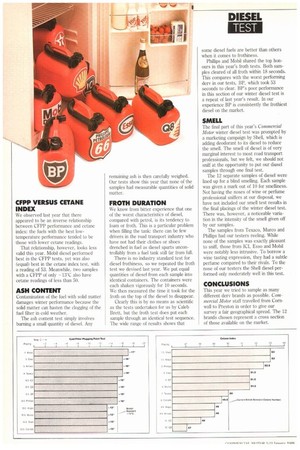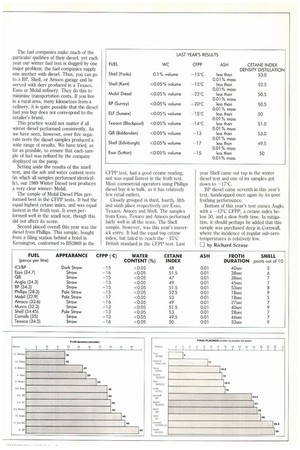CFPP VERSUS CETANE INDEX
Page 30

Page 31

If you've noticed an error in this article please click here to report it so we can fix it.
We observed last year that there appeared to be an inverse relationship between CFPP performance and cetane index: the fuels with the best lowtemperature performance tended to be those with lower cetane readings.
That relationship, however, looks less valid this year. Mobil diesel performed best in the CFPP tests, yet was also (equal) best in the cetane index test, with a reading of 53. Meanwhile, two samples with a CFPP of only —13°C also have cetane readings of less than 50.
ASH CONTENT
Contamination of the fuel with solid matter damages winter performance because the solid matter can hasten the clogging of the fuel filter in cold weather.
The ash content test simply involves burning a small quantity of diesel. Any remaining ash is then carefully weighed. Our tests show this year that none of the samples had measurable quantities of solid matter.
FROTH DURATION
We know from bitter experience that one of the worst characteristics of diesel, compared with petrol, is its tendency to foam or froth. This is a particular problem when filling the tank: there can be few drivers in the road transport industry who have not had their clothes or shoes drenched in fuel as diesel spurts uncontrollably from a fuel tank still far from full.
There is no industry standard test for diesel frothiness, so we repeated the froth test we devised last year. We put equal quantities of diesel from each sample into identical containers. The containers were each shaken vigorously for 10 seconds. We then measured the time it took for the froth on the top of the diesel to disappear.
Clearly this is by no means as scientific as the tests undertaken for us by Caleb Brett, but the froth test does put each sample through an identical test sequence. The wide range of results shows that some diesel fuels are better than others when it comes to frothiness.
Phillips and Mobil shared the top honours in this year's froth tests. Both samples cleared of all froth within 18 seconds. This compares with the worst performing dery in our tests, BP, which took 53 seconds to clear. BP's poor performance in this section of our winter diesel test is a repeat of last year's result. In our experience BP is consistently the frothiest diesel on the market.
SMELL
The final part of this year's Commercial Motor winter diesel test was prompted by a marketing campaign by Shell, which is adding deodorant to its diesel to reduce the smell. The smell of diesel is of very marginal interest to most road transport professionals, but we felt, we should not sniff at the opportunity to put our diesel samples through one final test.
The 12 separate samples of diesel were lined up for a blind smelling. Each sample was given a mark out of 10 for smelliness. Not having the noses of wine or perfume professional sniffers at our disposal, we have not included our smell test results in the final placings of the winter diesel test. There was, however, a noticeable variation in the intensity of the smell given off by our samples.
The samples from Texaco, Murco and Phillips had our testers reeling. While none of the samples was exactly pleasant to sniff, those from ICI, Esso and Mobil were notably less intrusive. To borrow a wine tasting expression, they had a subtle perfume compared to their rivals, To the nose of our testers the Shell diesel performed only moderately well in this test.
CONCLUSIONS
This year we tried to sample as many different dery brands as possible. Commercial Motor staff travelled from Cornwall to Preston in order to give our survey a fair geographical spread. The 12 brands chosen represent a cross section of those available on the market.
The fuel companies make much of the particular qualities of their diesel, yet each year our winter fuel test is dogged by one major problem: the fuel companies supply one another with diesel. Thus, you can go to a BP, Shell, or Amoco garage and be served with dery produced in a Texaco, Esso or Mobil refinery. They do this to minimise transportation costs. If you live in a rural area, many kilometres from a refinery, it is quite possible that the diesel fuel you buy does not correspond to the retailer's brand.
This practice would not matter if all winter diesel performed consistently. As we have seen, however, over five separate tests the diesel samples produced a wide range of results. We have tried, as far as possible, to ensure that each sample of fuel was refined by the company displayed on the pump.
Setting aside the results of the smell test, and the ash and water content tests (in which all samples performed identically), our 1989 Winter Diesel test produces a very clear winner: Mobil.
The sample of Mobil Diesel Plus performed best in the CFPP tests. It had the equal highest cetane index, and was equal fastest in the froth test. It even performed well in the smell test, though this did not affect its score.
Second placed overall this year was the diesel from Phillips. This sample, bought from a filling station behind a hotel in Kensington, conformed to BS2869 in the CFPP test, had a good cetane reading, and was equal fastest in the froth test. Most commercial operators using Phillips diesel buy it in bulk, as it has relatively few retail outlets.
Closely grouped in third, fourth, fifth and sixth place respectively are Esso, Texaco, Amoco and Shell. The samples from Esso, Texaco and Amoco performed fairly well in all the tests. The Shell sample, however, was this year's maverick entry. It had the equal top cetane index, but failed to reach the -15°C British standard in the CITY test. Last year Shell came out top in the winter diesel test and one of its samples got down to -17°C.
BP diesel came seventh in this year's test, handicapped once again by its poor frothing performance.
Bottom of this year's test comes Anglo, with a -13°C CFPP, a cetane index below 50, and a slow froth time. In mitigation, it should perhaps be added that this sample was purchased deep in Cornwall, where the incidence of regular sub-zero temperatures is relatively low.
0 by Richard Scrase
















































































